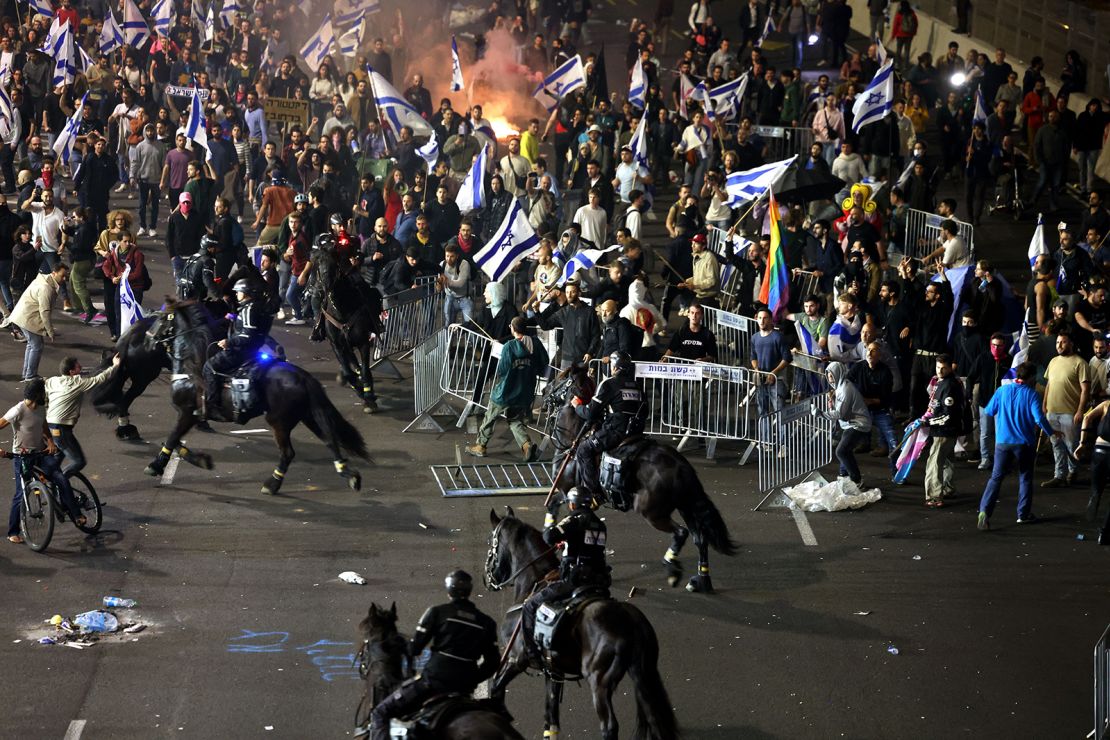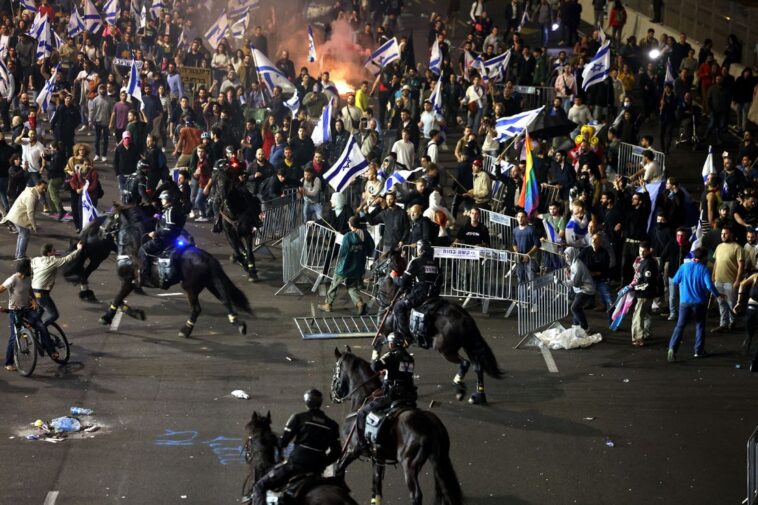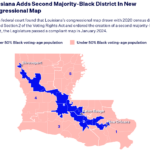
Israel on the Brink: Examining the Nation’s Tumultuous State
Recent comments by former Supreme Court Chief Justice Aharon Barak have sparked widespread debate about the future of Israel’s polity. Barak, in a recent Channel 12 interview, warned that the country is teetering on the edge of internal chaos, suggesting that Israel is very close to a civil war. This op-ed examines his claims, analyzes the situation through various lenses, and considers the potential implications for a nation already loaded with political and social tension.
Barak’s statements were not made in a vacuum. They come amid a series of events that have heightened the public’s concerns about the state’s future. Through his pointed observations, he noted that the nation’s divisions are enormous. In his view, not only are no genuine efforts being made to soothe these divisions, but actions are actively taken to fan the flames of discord.
Analyzing the Tensions: Dissecting the Nation’s Internal Divisions
When we try to figure a path through the latest state of affairs, it becomes clear that the nation is grappling with a mix of political dissent and public unrest. Various events, including protests that sometimes spiral into violence, have contributed to what Barak described as a situation on the verge of collapse. His comments come as protests evolve unpredictably—one day marked by vehicular accidents during demonstrations, the next by sporadic gunfire.
This series of unpredictable events has led many to see the situation as loaded with issues. From the very beginning of Israel’s establishment, the nation has been managing its tricky parts, balancing the ideals of democracy with the immediate need for security. Today, those fine points are increasingly overshadowed by a wave of fear and mistrust, making what once were manageable differences seem like insurmountable chasms.
Red Lines and Riddled Tensions: A Closer Look at Recent Political Moves
One central theme in Barak’s remarks is the idea of “red lines” that have already been crossed—boundaries once thought inviolable. According to his account, statements and actions that once symbolized the limits of acceptable political maneuvering have now been disregarded. One such red line was the firm stance taken against establishing a state commission of inquiry, a move seen as essential to ensuring accountability in government actions.
Another red line, as Barak explained, came from the erosion of the roles played by legal advisors. The dismissal of Shin Bet chief Ronen Bar has become a flashpoint in this context. Barak argued that this decision was not just a routine removal but a dangerous step that signified far deeper issues within the country’s critical institutions. His worry centers on a scenario where, regardless of what the court advises, the government chooses to act selectively—implementing only those judgments that align with a predetermined political agenda.
Deep-State Influence and Bureaucratic Power
Barak’s comments have also reignited discussion about the role of what some refer to as the “deep state”—the network of bureaucratic institutions that often wield independent power. In his view, these bodies have begun to override the decisions of elected officials by enforcing their own agenda. This dynamic, according to Barak, has blurred the boundaries between the branches of government, creating a situation where the bureaucracy appears to be setting the rules, rather than following them.
For many, this is one of the most intimidating aspects of the current political environment. The idea that a complex and intertwined network of government agencies might be steering policy to suit its own ends adds another layer of anxiety to an already tense situation. The fear is not simply about one institution overstepping its mandate but about an entire system that has lost sight of its intended function—a system built to serve the people now running the risk of serving its own interests.
Potential Dismissals: The Domino Effect on Democratic Institutions
Another critical point of contention relates to the possibility of further dismissals within key government institutions. Barak pointed to the recent cabinet meeting concerning the potential firing of Shin Bet chief Ronen Bar as a particularly glaring example of actions that might destabilize the nation’s delicate equilibrium.
Barak’s warning is that once one red line is crossed, it opens the door to a series of steps that could further erode the balance of power. In his prediction, following the dismissal of Bar, the attorney general’s position could be next on the chopping block. This chain reaction, if allowed to unfold, might result in a profound restructuring of Israel’s legal and political architecture—one that would have far-reaching consequences for both governance and public trust.
Understanding the Risk Factors: A Breakdown of the Troubling Developments
To better understand the developing crisis, it is helpful to break down the issue into several key risk factors:
- Political Polarization: Deep-seated divisions mean that any political move can be seen as a provocation, making it difficult to foster a spirit of unity.
- Institutional Erosion: The undermining of key institutions such as the judiciary and security apparatus could lead to unchecked executive power.
- Public Unrest: Ongoing protests and unrest create a volatile environment where isolated incidents can quickly escalate into broader violence.
- International Reactions: Actions perceived as undermining democracy can damage the country’s reputation on the global stage, inviting external interference and complicating diplomatic relations.
These factors are interrelated. For example, political polarization not only fuels public protests but also creates an environment in which institutional erosion is more likely to occur. Similarly, once key officials are dismissed, the power imbalance within the government becomes more pronounced, which in turn can lead to further polarization—making it even more difficult for the state to eventually find its way back to stable governance.
Legal Perspectives: The Role of Checks and Balances in Preventing Overreach
A critical element of Israel’s long-standing democratic framework is its system of checks and balances. When these mechanisms function effectively, they prevent any one branch of government from gaining too much power. Barak’s alarm, therefore, is not merely rhetorical; it represents a genuine concern that these essential controls are under threat.
In a system where judicial independence, executive accountability, and legislative oversight work in concert, each component is essential to preserving order and reinforcing the rule of law. However, as Barak warned, if the government chooses only to heed judicial counsel when it suits its views, then the entire system risks becoming unmoored. This is not just a theoretical problem—history has shown that unchecked executive power can lead to authoritarian practices, and in the worst cases, can pave the way to internal conflict.
It is important to note that Israel, like many democracies, is built on a foundation that includes both legal tradition and modern constitutional principles. The current tensions expose the fragile nature of this foundation. When legal advisors face pressure to step aside and when security chiefs are removed for political reasons, the system’s ability to function independently is compromised. This, in turn, can lead to decisions that favor immediate political expediency over strategic, long-term stability.
Comparative Insights: How Other Democracies Manage Internal Discord
Looking beyond Israel, other democracies have faced and managed similar challenges. In many instances, clear institutional boundaries and robust oversight mechanisms have helped steer countries away from internal conflict. For example, nations that have experienced mass protests often rely on independent investigative commissions or public inquiries to address long-standing grievances without resorting to politically motivated upheavals.
A comparative analysis reveals that the following practices are essential in preventing the kind of downward spiral now feared by critics like Barak:
- Transparent Investigations: Establishing independent commissions to look into contentious issues builds public trust and ensures that accountability is maintained without bias.
- Institutional Autonomy: Allowing key institutions such as the judiciary and security services to operate without undue political interference preserves the schedule balance of power.
- Public Dialogue: Engaging in open and honest conversations about national issues enables a society to address its problems head-on, rather than allowing tensions to simmer unchecked.
Israel’s path forward may well be illuminated by these examples from other regions. By adopting measures to promote transparency and safeguard institutional independence, the country could potentially avert the crisis that so many fear is looming on the horizon.
Risk of Escalation: Assessing the Potential for Civil Strife
The specter of civil conflict is not one to be taken lightly. Barak’s stark warning—that Israel is very close to a civil war—is a call to action. History has shown that once internal divisions reach a certain intensity, a minor incident can spark an escalation that leads to widespread violence.
Several factors contribute to this nervous atmosphere:
- Protest Dynamics: Protests, even when initially peaceful, carry the inherent risk of transforming into violent clashes when met with heavy-handed responses.
- Political Retaliation: The potential for retaliatory actions—such as dismissals of key officials—can further inflame public sentiment, leading to a cycle of reaction and counter-reaction.
- Social Media Amplification: In today’s digital age, the rapid spread of information (and misinformation) can magnify tensions, making it difficult for authorities to control narratives or calm emotions.
- Historical Precedents: The country has, in previous decades, narrowly avoided conflicts that threatened to split society along deep ideological lines.
These elements combine to produce a scenario where even a single flashpoint—be it a protest turning violent or the unexpected dismissal of another key official—could act as the final nudge toward open conflict. It is a nerve-racking prospect, one that casts a long shadow over everyday political decisions and threatens the delicate balance in a nation already on edge.
Reactions from Political Leaders: Divergent Views on the Future
Among the public figures reacting to Barak’s declarations, Foreign Minister Gideon Sa’ar has been particularly vocal. In a series of statements on social media, Sa’ar dismissed the notion that Israel could be drifting toward civil war, insisting that such a scenario is unrealistic. His commentary reflects a broader trend among some political leaders who seek to downplay fears of disintegration and instead focus on the resilience of the state.
However, this divergence in views highlights one of the key problems in the current discourse: the existence of starkly different interpretations of the same events. On one side, you have voices warning that steps taken against long-established norms could lead to irreversible outcomes. On the other, leaders who are determined to assure the public that the nation remains under control despite the barriers and twists and turns of current developments.
This duality raises important questions. Is the reassurance from some officials enough to counterbalance the warning signs pointed out by respected figures like Barak? Or does such optimism merely serve to mask the deep-seated concerns about how power is being concentrated in the hands of a few?
The Hidden Complexities of Institutional Reform and Political Accountability
One of the more confusing bits in this debate centers on institutional reform and the struggle to maintain political accountability. When traditional checks and balances are weakened, it can lead to a situation where decisions are made not on the basis of collective consensus but on the whims of those in power. This is particularly problematic in a democracy that prides itself on fairness and transparency.
For many, the key issue lies in how a government maneuvers through its tangled issues without sacrificing democratic principles. The delicate job of balancing security concerns with the need for accountability requires both patience and a clear commitment to the rule of law. It is essential, therefore, for public institutions to find their way through this maze of political and legal challenges without compromising on their core values.
Without such balance, there is the ever-present risk that individual actions—whether they be the firing of a security chief or the sidelining of judicial recommendations—could set dangerous precedents. These precedents might then be used to justify even more radical changes in the future, leaving the overall structure of the government in a state of constant flux.
Lessons from History: Avoiding the Pitfalls of Internal Division
History offers lessons about how divided societies can spiral into chaos if their leadership fails to address rising tensions. In several nations, ignoring the small distinctions and little twists of internal dissent has led to prolonged periods of instability and even armed conflict. The challenges faced by Israel today are not entirely unique. Many other states have had to cope with similar struggles, albeit in different forms and on different scales.
A closer look at these historical scenarios provides a kind of roadmap for what might be avoided. Some of the key lessons include:
| Historical Example | Lesson Learned |
|---|---|
| Post-war Reconstruction in Europe | The importance of rebuilding trust and ensuring political inclusivity after a conflict |
| Latin American Political Transitions | How failing to enforce independent judicial oversight can lead to authoritarianism |
| South African Reconciliation Process | The need for transparent and inclusive mechanisms to address past grievances |
These examples show that, while political and social transitions are certainly challenging, they are not insurmountable. The answer lies in creating inclusive dialogue and establishing robust institutions that can weather rough patches without giving in to the temptation of power centralization.
Charting a Way Forward: Proposals for Restoring Balance
In order to steer through these trying times, several measures have been proposed by various experts and political analysts. The following suggestions aim to help Israel find its way back to a state of balanced governance and stability:
- Reinforce Judicial Independence: The judiciary must be insulated from political pressures. Clear guidelines ensuring that decisions are made solely on legal merits can help restore confidence in the legal system.
- Establish Independent Oversight Committees: Transparent commissions that can investigate claims of misconduct across all branches of government will ensure that accountability remains a shared responsibility.
- Promote National Dialogue: Creating platforms for open conversation can help bridge the polarized segments of society, allowing for a more unified approach to resolving contentious issues.
- Reevaluate Dismissal Policies: Any decision to remove key officials should be based on clear, documented criteria to avoid perceptions of arbitrary or politically motivated actions.
- Engage the International Community: While national matters are primarily domestic, insights and assistance from trusted international partners can offer new perspectives and help monitor that the country’s core democratic values are preserved.
Each of these approaches emphasizes the need for transparency, accountability, and dialogue. They are designed not to stifle government action but to ensure that decisions are made in a manner that respects the pillars of democracy. When public trust is bolstered by these measures, it becomes much harder for any one faction or bureaucratic entity to steer the state toward extremes.
Restoring Public Trust: The Importance of Communication and Transparency
One of the most essential tasks for any government facing internal strife is to restore public trust. This is particularly true now, when voices from all sides express skepticism about the state’s trajectory. Effective communication, transparency about decisions, and accountability are all key components in rebuilding that trust.
Public perceptions are incredibly important. When government actions are shrouded in secrecy or are perceived as favoring certain political agendas over others, it can lead to an overwhelming sense of disenfranchisement among citizens. In contrast, when decisions are explained clearly and openly—detailing the reasoning behind them and the expected outcomes—it creates an environment of mutual respect and accountability.
The following steps can serve as guidelines for increasing transparency:
- Regular Briefings: Establish frequent and open briefings where officials explain ongoing policies and decisions.
- Public Accountability Sessions: Organize town hall meetings to allow citizens to ask questions and receive direct responses from government representatives.
- Access to Information: Ensure that official documents, particularly those related to high-stakes decisions, are made available in a timely manner while respecting national security boundaries.
Such measures can help counter the narrative that decisions are being taken solely for political gain. In doing so, the government can reinforce that it indeed has the best interests of the nation at heart—even when addressing the more tangled issues of national security and legal accountability.
Balancing Security and Freedom: The Tightrope of Modern Governance
The current debate also touches on one of the most nerve-racking challenges of modern governance: the balance between ensuring security and preserving freedom. This is a tricky part that many nations have had to manage, and Israel is now at a crossroads.
On one hand, government actions aimed at protecting national security are indispensable. On the other, overly aggressive measures that undermine the rule of law or marginalize dissenting voices threaten the democratic fabric that guarantees freedom for all citizens.
The challenge lies in finding a middle ground that does not sacrifice one essential element for the sake of the other. This requires leaders to be both pragmatic and principled, ensuring that security measures have clear limits defined by law. Without these limits, there is a risk that measures meant to protect the state inadvertently erode the very freedoms that are supposed to be safeguarded.
A careful review of policies and a commitment to judicial oversight can help ensure that measures taken in the name of security do not cross lines that are essential to the nation’s long-term stability. Working through these delicate issues requires not only legal expertise but also a deep commitment to the democratic values that define modern Israeli society.
The Role of Media and Public Discourse in Shaping the Future
The media plays a super important role in how the public perceives the ongoing political crisis. Honest, balanced reporting is necessary to help citizens make sense of events that are sometimes misrepresented by either political operatives or sensationalist outlets. When the media gets into the nitty-gritty of the issues—explaining the subtle details, the little distinctions in policy decisions, and the overarching factors at play—it becomes a crucial partner in restoring public dialogue.
For the media, this means moving beyond soundbites and headline figures. It involves a more thoughtful approach to unraveling the twists and turns of current events, highlighting not only the immediate controversies but also offering a wider historical and legal context. By doing so, the media can foster a more informed citizenry, one that is better equipped to challenge decisions and hold leaders accountable.
Moreover, social media platforms now serve as double-edged swords. They provide rapid dissemination of information but can also amplify division if used irresponsibly. As such, responsible usage and fact-checking by those in the media are essential to prevent the spread of misinformation and reduce the potential for needless conflict.
Conclusion: The Imperative for Unity and Constructive Change
The warnings issued by figures like Aharon Barak compel us to take a closer look at Israel’s current internal challenges. The various red lines that have been crossed, the potential for further dismissals of key officials, and the overarching influence of unchecked bureaucratic power all point to a moment when critical decisions must be made.
While dissenting opinions, such as those from Foreign Minister Gideon Sa’ar, offer reassurance that internal collapse is not inevitable, the underlying tensions remain undeniable. There is a pressing need for actions that restore balance, uphold accountability, and rebuild public trust.
The path ahead is fraught with confusing bits and tangled issues. However, it also presents an opportunity—a chance to reintroduce transparency, foster dialogue, and reinforce the democratic institutions that are the backbone of Israeli society. The measures discussed, from reinforcing judicial independence to creating robust oversight and ensuring open communication, are not just reactive; they are proactive steps toward long-term stability.
In these trying times, it is essential for leaders and citizens alike to recognize that the current challenges, though intimidating and nerve-racking, can be managed through diligent reform and collective effort. By embracing lessons from history, engaging in open discourse, and committing to the values upon which the nation was built, it is possible to chart a way forward that prevents the descent into full-scale internal conflict.
Ultimately, the future of Israel may very well depend on the ability of its people and its leaders to work through these tangled issues—finding their way past red lines and restoring faith in the institutions meant to serve the public. The stakes are high, but so too is the commitment of an entire society determined to secure its democratic legacy for generations to come.
In conclusion, while there may be significant challenges ahead and a legitimate fear of a spiral into chaos, there is also an opportunity—a chance to renew the national commitment to a balanced, inclusive, and accountable form of governance. As observers, citizens, and stakeholders in the future of Israel, all parties must engage in this process not only to avoid the pitfalls of division but to build a more resilient and united nation.
Originally Post From https://www.jpost.com/breaking-news/article-846960
Read more about this topic at
Israel on the Brink by Ilan Pappé: 9780807018798
Israel on the Brink – Oneworld Publications


